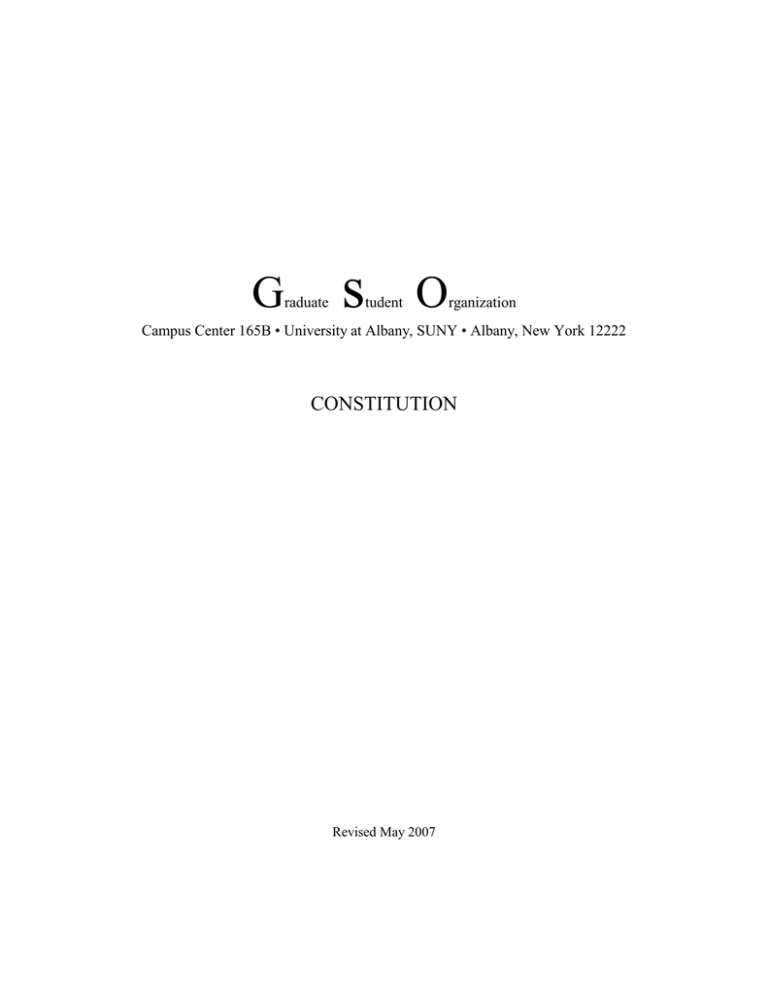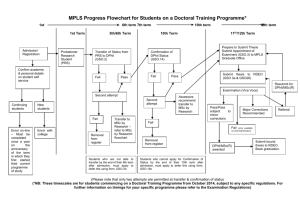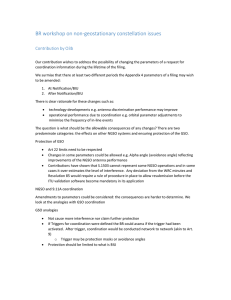Constitution (.doc)</font size=-2>
advertisement

G raduate s tudent O rganization Campus Center 165B • University at Albany, SUNY • Albany, New York 12222 CONSTITUTION Revised May 2007 ARTICLE I: PREAMBLE The University at Albany Graduate Student Organization (GSO) was voted into existence in the Spring of 1990 to address the needs of the University at Albany graduate students. The rules governing its operation shall be divided hierarchically into the Constitution, the By-Laws and the Finanical Guidelines. ARTICLE II: NAME The name of this organization shall be the University at Albany GRADUATE STUDENT ORGANIZATION, hereinafter referred to as the GSO. ARTICLE III: PURPOSE Section 1: General Goals: The purpose of the GSO is to identify and protect the rights of graduate students, to advocate their interests and to provide services that enhance the social, academic, professional and cultural environment of the University. Section 2: Affirmative Action: The GSO is committed to a program of affirmative action in order to allow previously discriminated against groups and individuals to gain equality of opportunity in all academic and professional settings. The GSO is committed to the elimination of discrimination based on age, race, ethnicity, color, religion or creed, gender, sexual orientation, marital status, economic status, veteran status, physical ability or national origin. The goal of this initiative is to create more opportunities and greater participation for such classes of individuals and to help create an atmosphere of equality and cooperation of people with diverse experiences, cultures and backgrounds. This commitment shall apply to all funded and recognized groups of this Organization, as well as individual members and officers of the GSO. ARTICLE IV: ORGANIZATIONAL STATUS No part of the net earnings of the GSO shall be to the benefit of or be distributable to, its members, trustees, officers or other private persons, except where the GSO shall be authorized and empowered to pay reasonable compensation for services rendered and make payments and distributions in furtherance of the purposes set forth in Article III, Sections 1 and 2 hereof. No substantial part of the activities of the GSO shall be the participation or intervention in any political campaign on behalf of any political party or candidate seeking or holding public office (including the publishing or distribution of statements). Notwithstanding any other provision of this constitution, the GSO shall not carry on any other activities not permitted to be carried on by a corporation exempt from Federal Income tax under Section 501(c)(4) of the Internal Revenue Code of 1986. ARTICLE V: MEMBERSHIP Section 1: Rights.: No graduate student shall be excluded from participation in, be denied the benefits of, GSO -1- or be subjected to discrimination in the GSO based on age, race, ethnicity, color, creed, gender, sexual orientation, marital status, economic status, veteran status, physical ability or national origin. Section 2: Members: All currently enrolled graduate students of the University at Albany, who have been billed for the GSO activity fee, are members of the GSO. ARTICLE VI: GSO ASSEMBLY Section 1: Responsibilities: The GSO Assembly shall act as the legislative body of the GSO. It shall be responsible for approving the budget; developing, approving and adopting policy for the GSO; approving GSO related position appointments and relaying information from the GSO Assembly to constituents. Section 2: Representative Membership: Every university department or intra-departmental program with GSO members is entitled to one representative in the Assembly. Departments or intra-departmental programs with forty (40) or more GSO members within said program shall be allotted one additional Assembly Representative. Each department or intra-departmental program is also entitled to declare one alternate for each Assembly Representative. Membership is restricted to elected representatives and alternates. Representatives and alternates must be chosen from graduate students enrolled in the department who are members of the GSO. Each Recognized Graduate Student Organization (RGSO) is entitled to one representative in the Assembly. An RGSO with forty (40) or more GSO members shall be allotted one additional representative. Each RGSO is entitled to declare an alternate for each Assembly Representative. Representatives and alternates must be chosen from membership of the RGSO, who are also members of the GSO. Section 3: Assembly Speaker: The GSO Assembly shall elect from its membership a Speaker to serve for that academic year (Fall and Spring). The election of the Assembly Speaker shall take place at the first Assembly meeting of the Fall semester. The Assembly Speaker shall have the power to call a special session of the GSO Assembly. In case of emergency, the Assembly Speaker will contact all voting members of the general assembly. Section 4: Senator: The GSO general membership shall elect a GSO Lead Senator to the University at Albany Senate during the GSO elections. Four additional senators will be appointed by the President of the GSO and approved by the GSO Assembly at the first meeting of the Fall semester. All GSO Senators are required to sit on several of the University at Albany Faculty Senate Committees. The GSO Senators are required to attend all meetings of the GSO Assembly. The four appointed GSO Senators are also required to write a summary of those Senate Committee proceedings, which will be turned over to the Lead Senator who in turn will report at the next GSO Assembly meeting. If the Lead Senator should resign before the end of their term, the replacement shall be appointed by the President and ratified by two-thirds (2/3) of the GSO Assembly. If the Lead Senator is not filled during the Spring General elections, the Senator shall be appointed by the President and ratified by two-thirds (2/3) of the GSO Assembly at the first meeting of the Fall semester. GSO -2- Section 5: SUNY Assembly Representative: The GSO general membership shall elect a GSO member to serve as a SUNY Assembly Representative for the upcoming academic year. Election of the SUNY Representative will take place once per year in conjunction with the GSO general elections. The SUNY Representative is required to attend all meetings of the SUNY Assembly, to report on the proceedings at the GSO Assembly meetings, and to write a one-half page summary of those SUNY Assembly proceedings that will be provided to the Office Manager for posting on the GSO website. The SUNY Assembly Representative represents the University at Albany’s Graduate Students at the SUNY statewide Assembly. If the position is not filled during the general elections a GSO member will be appointed by the President of the GSO and ratified by two-thirds (2/3) majority of the GSO Assembly at the first meeting of the Fall semester. If the SUNY Assembly Representative should resign before the end of their term, the replacement shall be appointed by the President and ratified by two-thirds (2/3) of the GSO Assembly. Section 6: University Council Representative: The GSO general membership shall elect a student to serve as a University Council Representative for the upcoming academic year. The University Council Representative is required to attend all meetings of the University Council, and report on the proceedings to the GSO Assembly. Election of the University Council Representative will take place once per year in conjunction with GSO officer elections. If the University Council Representative should resign before the end of their term, the replacement shall be appointed by the President and ratified by two-thirds (2/3) of the GSO Assembly. If the University Council Representative is not filled during the Spring General elections, the Senator shall be appointed by the President and ratified by two-thirds (2/3) of the GSO Assembly at the first meeting of the Fall semester. Section 7: Meetings: The GSO Assembly shall conduct regular meetings at least once each month during the Fall and Spring semesters. Meetings shall be publicly announced no less than one week in advance. All meetings shall be open to all members of the GSO. Only official representatives or alternates may vote at GSO Assembly meetings. There shall be no votes by proxy. A quorum for conducting official business shall consist of at least two-thirds (2/3) of the registered Assembly representatives. The Assembly Speaker President shall chair meetings of the GSO Assembly. Should the Assembly Speaker be unable, the Vice President shall Chair of the GSO Assembly. Should neither be able, another member of the GSO Executive Board will act as Chair of the GSO Assembly. Section 8: Parliamentary Procedure: GSO Assembly meetings shall operate along the principles of Roberts Rules of Order. Section 9: Legislative Committees: The GSO Assembly has the power to create legislative committees. Section 10: Audits: The GSO Assembly has the power to, at any time, call for an audit of the GSO records, financial or otherwise. The GSO Executive Board has the power to, at any time, call for an audit of any RGSO’s records, financial of otherwise. Section 11: Impeachment: A) The GSO Assembly shall have the power to impeach and remove from office any GSO officeholder, upon conviction of financial impropriety, gross negligence or gross misconduct, while performing duties related to their office. GSO -3- B) When a question of impeachment is brought before the GSO Assembly, the GSO Assembly shall vote whether to investigate. C) Alternately, any GSO member, upon reason to believe there is evidence to impeach any GSO officeholder may require an impeachment investigation by a petition, submitted to the GSO Assembly, of at least one-third (33%) of GSO Assembly members present. D) The GSO Assembly shall have the power to try all impeachments, with the GSO Judicial Board presiding. Such proceedings shall be open to all GSO members. No person shall be convicted without being granted a fair opportunity to explain and defend his or her position and present contravening evidence. An impeachment needs the concurrence of two-thirds (2/3) of the GSO Assembly members present. ARTICLE VII: EXECUTIVE BOARD Section 1: Positions: The Executive Board shall consist of six executive officers: the President, the Vice President, the Treasurer, the Multi-Cultural Affirmative Action Officer, the Programming Committee Chair and the Grants Committee Chair. Each officer of the Executive Board and the Assembly Speaker shall have full voting privileges. Section 2: Meetings: The Executive Board shall meet regularly. At each meeting, each officer shall report on their activities since the previous meeting and present for discussion and advisement their proposed agenda for the immediate future. Section 3: Formal Power: The Executive Board may invoke certain formal powers by a vote of at least four out of the seven voting officers. These formal powers include verification of large expenditures within the approved budget, establishment of executive committees, and any other powers given to the Executive Board by the GSO Assembly. Section 4: General Powers: The elected officers have the powers that have been approved by the GSO Assembly. Each officer shall have a non-voting seat on the GSO Assembly, allowing him or her to make motions and speak on matters. Section 5: Term of Office: Elected and appointed officers shall serve one year beginning June 1. Section 6: Nominations: Any GSO member may be nominated or may self-nominate for any elected GSO position. All nominations shall be made in writing, using the GSO Elected Officer Nomination Form. In the event that a member is nominated for more than one elected GSO officer position, they must withdraw themselves in writing from all except one position prior to the candidate forum. Section 7: Elections: GSO General Elections for President, Vice President, Treasurer, Multi-cultural Affirmative Action Officer, shall be held during the Spring Semester each year. (Please note that Elections for GSO Lead Senator and SUNY Assembly Representative and University Council are in conjunction with Executive Board Elections as state in their respective sections of this document.) Contingency Plan: GSO -4- 1. Should no one run for a position during the Spring general election, there should be a special follow up election to fill the vacancy. 2. If nobody runs during the special election, the incoming President should appoint a GSO member to take the position, which shall be ratified by two-thirds (2/3) of the GSO Assembly at the first meeting of the Fall semester. Section 8: Appointed Officers: Officers appointed by the president shall consist of a Grants Committee Chair and a Programming Committee Chair. The one-year term of the Grants Chair and the Programming Chair will begin June 1st and continue through May 31st, the following year. Upon confirmation of the appointees by the GSO Assembly, both Chairpersons are subject to the impeachment policies outlined in the GSO Constitution. Section 9: Office Vacancies: In the event the Office of the President is vacant, or the President is unable to fulfill his/her duties, the Vice President shall become President and assume all powers of the President. Should any Executive Officer position become vacant, the President shall appoint a replacement, except for the GSO Assembly Speaker. A vacancy in this position is subject to a new election following the guideline established in Article VI, Section 3. The Assembly must confirm the appointee by majority vote. Section 10: Officer Functions: The duties of the executive officers shall consist of those enumerated herein, and those non-enumerated duties, which are consistent with the fulfillment of their enumerated duties. a. President: The President shall act as Chief Executive Officer of the GSO and as its chief spokesperson and representative. The President has the power to call a special session of the GSO Assembly. The President shall be responsible for co-authoring large expenditures. The President shall appoint GSO members as the Grants Chair and Programming Chair and to the other unassigned seats on the various University Committees. These appointees must be confirmed by majority vote of the assembly. The President shall have signature power on all vouchers. b. Vice President: The Vice President shall chair the Recognized Graduate Student Organization (RGSO) Funding Committee. The Vice President cannot be an Assembly Representative or Alternate for any RGSO. Nor can the Vice President be on the Executive Board or hold any office of any RGSO. c. Treasurer: The Treasurer shall be the chief financial officer of the GSO, preparing the budget and submitting it to the GSO Assembly for approval. The Treasurer shall report on the financial status of the GSO to the GSO Assembly and officers upon request. The Treasurer shall operate in accordance with the financial guidelines approved by the GSO Assembly. The Treasurer shall have signature power on all vouchers. d. Multi-Cultural Affirmative Action Officer: The Multi-Cultural Affirmative Action (MCAA) Officer has the primary responsibility for development, implementation, and maintenance of the organizations affirmative action and anti-discrimination policies. The MCAA Officer will be responsible for enforcing that all officers, committees, and programs are in accordance with the anti-discrimination and affirmative action policies. They will act as the liaison between the GSO and the University's Affirmative Action Officer, and they will be the spokesperson for the GSO Multi-Cultural Affirmative Action Committee. ARTICLE VIII: COMMITTEES Section 1: Legislative Committees: Legislative Committees shall be formed by the GSO Assembly for the purpose of gathering and/or processing information for presentation to the GSO Assembly. The Assembly Speaker or in their absence the President will determine the chairpersons of the Legislative committees and hold an ex-officio seat on each. If the investigation of either of these officers is the purpose of the GSO -5- committee then the other officer shall preside. Non-office holding members of the GSO may be Legislative Committee members. These committees shall operate within the GSO By-Laws and Financial Guidelines. Should executive Committees be needed during the summer semester, the GSO President shall assume all Committee functions performed by the Assembly Speaker during the Fall and Spring semesters. The committee Chair shall have signature power on agency disbursement forms relative to their committee. Section 2: Executive Committees. The Executive Board for the purpose of executing policy approved by the GSO Assembly shall form executive Committees. The Assembly Speaker shall determine the chairs of the Executive committees and hold an ex-officio seat on each. Non-office-holding members of the GSO may be Executive Committee members. These committees shall operate within the GSO By-Laws and the GSO Financial Guidelines. Should Executive Committees be needed during the Summer semester, the GSO President shall assume all Committee functions performed by the Assembly Speaker during the Fall and Spring semesters. The Committee Chair shall have signature power on agency disbursement forms relative to their committee. Section 3: MCAA Committee. The Multi-Cultural Affirmative Action Officer shall chair the Affirmative Action Committee. The committee shall be made up of persons representing the diversity of the graduate student body. The purpose of the Affirmative Action Committee is to review GSO policies; suggest improvements; monitor the implementation of the policies; address concerns and questions regarding affirmative action and discrimination; and act in an advisory and advocacy role. A member of the MCAA Committee shall have a voting seat on all other GSO Committees. All questions of legality of policies are referred to the Judiciary Board. This committee shall operate within the GSO By-Laws and the GSO Financial Guidelines. Appointments to the Committee are made on a per semester basis and are renewable at the discretion of the MCAA Chair. The MCAA Chair will be responsible for developing a detailed cost estimate for each activity. All arrangements necessary for its completion are the responsibility of the MCAA Chair. A report of GSO programming activities must be made to the GSO Assembly at the beginning of each semester and at the first GSO Assembly meeting of each month during the academic year. The Committee Chair shall have signature power on agency disbursement forms relative to their committee. All arrangements necessary for its completion are the responsibility of the MCAA Chair. Section 4: RGSO Committee: The RGSO Committee shall be chaired by the Vice President, who must appoint a committee of GSO members. The purpose of this committee is to recognized student groups and to allocate them funds. This committee shall operate within the GSO By-Laws and the GSO Financial Guidelines. Appointments to the Committee are made on a per semester basis and are renewable at the discretion of the Vice President. The Committee Chair shall have signature power on agency disbursement forms relative to there committee. Section 5: Grants Committee: The Grants Committee shall be chaired by the Grants Chair, who must appoint a committee of GSO members. The purpose of this committee is to allocate and disburse research and travel grant funds to qualifying applicants. The committee shall operate within the GSO By-Laws and the GSO Financial Guidelines. Appointments to the Committee are made on a per semester basis and are renewable at the discretion of the Grants Chair. The Committee Chair shall have signature power on agency disbursement forms relative to there committee. Section 6: A Programming Committee: The GSO Programming Chair is responsible for the GSO Programs Committee, which develops and implements campus wide educational, cultural, and social activities and any activity designated as programming by the Executive Committee or the GSO Assembly. The Programming Chair will be responsible for developing a detailed cost estimate for each activity. All arrangements necessary for its completion are the responsibility of the Programming Chair. A report of GSO programming activities must be made to the GSO Assembly at the beginning of each semester and at GSO -6- the first GSO Assembly meeting of each month during the academic year. Wherever possible, the Programming Chairperson shall work in conjunction with the Vice President to incorporate activities developed by recognized student groups with GSO activities. Appointments to the Committee are made on a per semester basis and are renewable at the discretion of the Programming Chair. The programming Chair shall have signature power on vouchers relative to there committee. Section 7: Election Committee: The Election Committee is responsible for all aspects of the annual spring elections. This includes, but is not limited to, choosing election dates, hiring election workers, producing all election materials, and counting ballots. The Assembly Speaker with the Justices serving as committee members, chairs the committee. The Committee Chair can appoint up to four additional committee members. If any member of the committee is officially seeking office, they are excused from the committee and the president appoints a replacement. If upon the counting of the ballots a committee member discovers his/her name has been submitted as a write-in candidate, that person is to recuse his/herself from further participation in ballot counting for that specific office unless they refuse the position. The Committee Chair shall have signature power on agency disbursement forms relative to there committee. ARTICLE IX: JUDICIAL PROCEDURES Section 1: Graduate Student Judicial Board: In order to adjudicate questions involving the GSO Constitution, By-Laws, Financial Guidelines or Operating Procedures/Guidelines or to mediate disputes brought forward by a GSO member or any other such issue as designated by the GSO Assembly, there shall be a Graduate Student Judicial Board, hereinafter called the Judicial Board. The Judicial Board shall consist of three GSO members, ideally one from each campus or from different University Schools, appointed by the President and ratified by two-thirds (2/3) of the GSO Assembly. Section 2: Term of Office: The Judicial Board shall serve from the date of ratification until the first Assembly meeting of the following year. Section 3: Constitutional Questions: When questions of GSO Constitutional interpretation arise, the Judicial Board shall create a Judicial Review Taskforce consisting of the three members of the Judicial Board and one Executive officer chosen by lot. The proceedings of the Judicial Review Task force shall be open to all GSO members and its decisions shall be final. Section 4: Mediation: The Judicial Board shall act as a mediator in any dispute that is brought before them by a GSO member or GSO officer. Any factor, which limits the impartiality of a Judicial Board member, is cause for that member to excuse themselves from the Board. Such recusable factors include, but are not limited to, friendship with, marriage to, personality conflict with or affiliation with a disputant other than acquaintance through the GSO. Section 5: Impeachment Investigation: If an impeachment investigation is required, the Judicial Board shall preside over the impeachment trial. ARTICLE X: AMENDING PROCESSES Section 1: Constitution: The Constitution and any changes shall first be approved by three-quarters (3/4) of the Assembly, then, in a membership-wide election, ratified by two-thirds (2/3) of those GSO members voting. GSO -7- Section 2: By-Laws: The By-Laws and any amendment to them shall be adopted by two-thirds (2/3) of the GSO Assembly. Section 3: Operating Procedures/Guidelines: The Operating Procedures/Guidelines shall be adopted and amended by a simple majority of the GSO Assembly. Section 3: Financial Guidelines: The financial guidelines shall be adopted and amended by a simple majority of the GSO Assembly. GSO -8-



